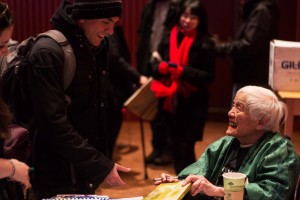Grace Lee Boggs, an activist in the labor, civil rights, black power, Asian-American, women’s and environmental justice movements of the last several decades, spoke on campus on Martin Luther King Jr. day for the event “What Time is it?: An Afternoon with Civil Rights Pioneer Grace Lee Boggs.” Boggs attended Barnard College for her undergraduate degree and received her doctorate in philosophy from Bryn Mawr College. The 97-year old currently lives in Detroit, working with the Detroit City of Hope campaign and the Beloved Communities Initiative. She has written five books, including her autobiography, Living for Change. On Monday, the S&B’s Hayes Gardner sat down with Boggs to discuss her involvement with movements of past and present, as well as her vision of the future.

Growing up, what made you want to become a figure of activism, feminism and civil rights?
Well, I didn’t want to become all of that when I was very little. When I was growing up, I learned that changes were necessary in the world from the Chinese workers in my father’s restaurant. They said “leave her on the hillside to die, she’s only a little baby girl.” And that taught me there were changes necessary in this world. It wasn’t until after I got my doctorate in 1940 [and I was told] we don’t hire Orientals. I got a job in a library, part-time for ten dollars a week. … And at that time A. Philip Randolph was organizing a march on Washington.
What does it mean to you to be speaking on Martin Luther King Jr. Day?
What I thought to myself as I listened to Obama is, what would Dr. King say? What time is it in the clock of the world? We need a radical revolution of values. We not only need to be inclusive of other racial groups and other sexual [orientations], but we need a radical revolution of values against militarism and materialism.
You’ve been a part of the labor, civil rights, black power, Asian-American, women’s and environmental justice movements. Are you pleased with how much progress has been made in these movements during your lifetime?
The fact that we are facing such an enormous crisis, economically, is a demonstration that the opportunity now exists for us to create something new. We have an opportunity to go beyond jobs and capitalist categories, comparable to that which people had gone beyond hunting and gathering to agriculture. The potential for cultural revolution is enormous.
You currently work with the Detroit City of Hope and the Beloved Communities Initiative. What sort of work do you do with those organizations?
All over the country there were small groups beginning to reassess their relationships to the community and thinking of re-imagining education, re-imagining work, re-imagining governments. It’s a wonderful time of the clock of the world. There are dangers, but there are also opportunities.
What message is conveyed in your autobiography, Living for Change?
That we need to create new dreams for the 21st century. That the 21st century’s dreams were around mass production and that high-tech globalization has endangered that. And I think the opportunity for creating new dreams and the challenge to create new dreams is enormous. And your generation has a great chance in dreaming those.


















































